Zenoti POS: An In-Depth Analysis for Businesses
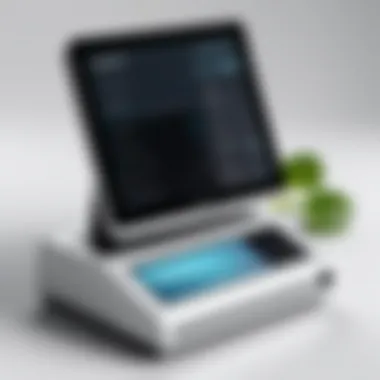
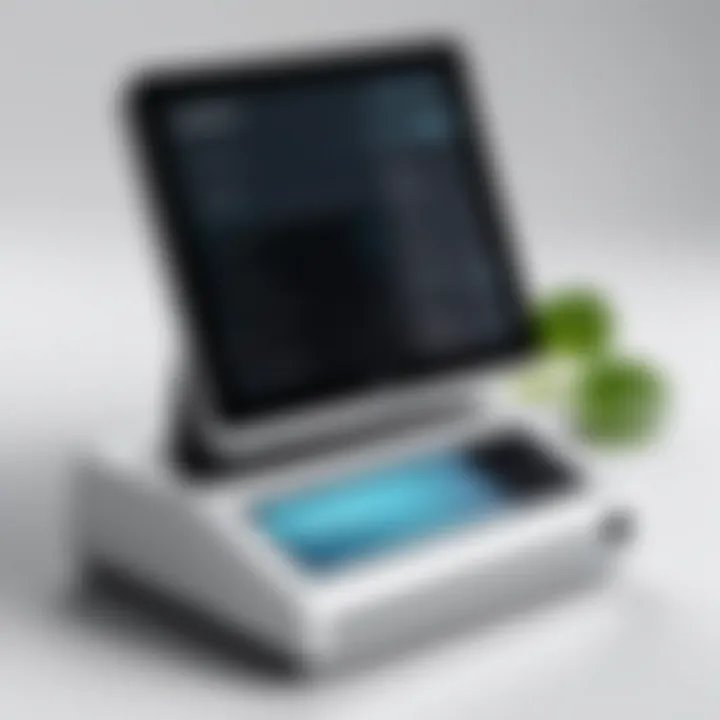
Intro
The modern wellness and beauty industry is highly competitive, requiring businesses to adopt effective strategies for managing operations. A robust point-of-sale (POS) solution like Zenoti POS can streamline processes and enhance customer experiences. This article provides a thorough examination of Zenoti POS, exploring its features, benefits, pricing, and integration capabilities. In doing so, we aim to equip businesses with the necessary insights to make informed decisions.
Software Overview
Zenoti POS offers a comprehensive solution designed specifically for the wellness and beauty sector.
Features and Functionalities Overview
Zenoti POS boasts a range of features that facilitate efficient business management. Essential functionalities include:
- Appointment scheduling: This helps businesses manage client bookings effortlessly.
- Payment processing: Secure and diverse payment options are available, ensuring convenience for customers.
- Inventory management: Users can track product stock levels in real time, preventing any mismanagement of resources.
- Reporting and analytics: The software offers insights into sales patterns, helping businesses make data-driven decisions.
User Interface and Navigation
The user interface of Zenoti POS is designed to be intuitive. Its layout is straightforward, which minimizes the learning curve for new users. Navigation is largely smooth, allowing employees to perform tasks quickly. This efficiency can enhance customer service and overall productivity in a business.
Compatibility and Integrations
Zenoti POS is compatible with various devices, such as tablets and smartphones, enabling businesses to operate flexibly. Integration capabilities include compatibility with third-party applications, such as QuickBooks and Mailchimp, providing a cohesive technological ecosystem for users.
Pros and Cons
Strengths
Zenoti POS has several strengths that make it an attractive option for businesses. Key advantages include:
- Industry-specific focus: Tailored features specifically designed for wellness and beauty enterprises.
- Comprehensive reporting tools: In-depth analytics support strategic business planning.
- Customer management: Enhanced CRM capabilities to nurture customer relationships.
Weaknesses
However, Zenoti POS is not without its limitations. Potential drawbacks may involve:
- Learning period: Some users may experience a steep learning curve, especially if they are not tech-savvy.
- Cost implications: Depending on the chosen plan, some small businesses may find it to be on the pricier side.
Comparison with Similar Software
When compared to Square and Clover, Zenoti POS stands out primarily for its specialized features that cater to the wellness industry. However, Square is often praised for its affordable pricing options, which may appeal to startups.
Pricing and Plans
Subscription Options
Zenoti POS offers several subscription plans to accommodate varying business needs. Each plan's features varies, allowing for scalability depending on the growth of the business.
Free Trial or Demo Availability
Most businesses can access a free demo. This allows potential users to try the platform and determine its suitability before making a financial commitment.
Value for Money
The pricing structure of Zenoti POS can be seen as justified if businesses take full advantage of the features offered. The comprehensive tools available often lead to better operational efficiency and profit margins over time.
Expert Verdict
Final Thoughts and Recommendations
Overall, Zenoti POS emerges as a powerful tool for wellness and beauty businesses. Its array of features and specialized focus make it a strong candidate for those seeking a POS solution tailored to their needs.
Target Audience Suitability
The software is particularly well-suited for medium to large-sized enterprises that require robust management tools. Small startups might find it a bit overwhelming in terms of features and pricing.
Potential for Future Updates
With emerging trends in technology, one can speculate that future updates may enhance AI-driven analytics and customer engagement features, aligning with the ever-evolving needs of the industry.
Zenoti POS stands at the intersection of technology and business efficiency, making it a pivotal asset for organizations in the wellness and beauty landscape.
Understanding Zenoti POS
Zenoti POS represents a pivotal advancement in point-of-sale technology, specifically designed for the wellness and beauty industries. This section elucidates what Zenoti POS is and why comprehending its core concepts is essential for decision-makers. Given how businesses in these sectors often have unique operational needs, an understanding of Zenoti POS can lead to significant improvements in client interactions and overall efficiency. With its specialized features tailored to the requirements of spas, salons, and fitness centers, Zenoti POS provides more than just basic transactional capabilities.
Definition and Overview
Zenoti POS is a cloud-based point-of-sale system that automates and harmonizes various aspects of business operations. It integrates payment processing, appointment scheduling, inventory management, and customer relationship management into a single platform. This consolidation helps eliminate redundancy and errors while driving operational effectiveness. The use of a centralized database means that staff can access real-time information. By understanding what Zenoti POS entails, businesses can appreciate its value proposition and how it compares to traditional POS systems.
Target Industries
Zenoti POS primarily caters to the wellness and beauty industries but has broad applications across several related sectors. Typical users include:
- Spas: Facilitating appointment bookings and managing treatment inventory.
- Salons: Streamlining services offered while managing client appointments and payments.
- Fitness Centers: Optimizing membership management and scheduling classes.
- Health and Wellness Studios: Enabling seamless client check-ins and promoting services efficiently.
The specific features of Zenoti POS have been crafted to address distinct industry demands, making it a preferred choice for professionals operating within these domains. Understanding these target industries enhances the awareness of potential customers who benefit most from implementing Zenoti POS.
Key Features of Zenoti POS


Understanding the key features of Zenoti POS is crucial for businesses in the wellness and beauty sector. These features directly impact operational efficiency and customer satisfaction. Every feature is designed to streamline processes, improve responsiveness, and enhance the overall user experience. The following subsections provide an in-depth look at the standout features of Zenoti POS.
Intuitive User Interface
The Intuitive User Interface of Zenoti POS is one of its most significant attributes. Designed to be user-friendly, it requires minimal training for staff members. The layout is logical and organized, enabling quick navigation through various functions.
Components like visual icons and color coding support immediate recognition of essential actions. This leads to reduced check-out times, enhancing customer satisfaction. Staff can access client profiles, treatment histories, and appointment details in just a few clicks. The simplicity of the interface can positively influence daily operations, minimizing errors and reducing frustration among users.
Appointment Scheduling
Effective Appointment Scheduling is vital for businesses that depend heavily on client bookings. Zenoti POS offers a robust scheduling tool that allows clients to book appointments through multiple channels, including the website and mobile app. Businesses can manage appointments in real-time, ensuring optimal use of resources.
The system allows for drag-and-drop functionalities, changing bookings easily as requirements shift. Automated appointment reminders can reduce no-shows. This overall efficiency can result in both increased revenue and improved client trust in a business’s operational capabilities.
Inventory Management
An essential aspect of any retail or service-oriented business is Inventory Management. Zenoti POS features comprehensive tools for tracking inventory levels, setting reorder points, and managing suppliers. Businesses can analyze performance data to identify high-demand products and optimize stock levels.
The system enables integrations with vendors for seamless ordering processes. With real-time updates on inventory metrics, businesses can prevent shortages or overstock situations. As a result, effective inventory management translates into cost savings and a more streamlined operation.
Payment Processing
Zenoti POS provides advanced Payment Processing options, integrating with various payment platforms to cater to the diverse needs of clients. The system supports multiple payment types, including credit cards, mobile wallets, and gift cards. This flexibility can cater to a broader audience and create a smoother checkout process.
Security is paramount in payment systems, and Zenoti ensures compliance with industry standards. Businesses benefit from reduced transaction fees due to the competitive rates offered. Comprehensive financial reporting further allows for better cash flow management and insight into sales patterns.
Reporting Tools
The Reporting Tools within Zenoti POS offer rich analytical capabilities. Users can generate detailed reports covering sales performance, customer demographics, and inventory turnover. These insights are indispensable for making data-driven decisions.
Businesses can analyze trends over time and adjust strategies accordingly. Customizable reports enable users to focus on specific areas of interest, facilitating deeper business insights. Understanding these metrics is essential for long-term strategic planning and operational improvement.
"In the fast-paced wellness and beauty industry, having actionable insights is as critical as the services offered."
Overall, the key features of Zenoti POS not only improve daily functions but also contribute to overall growth and stability of the business. By leveraging these features, companies can optimize their operations and enhance the customer journey.
Operational Benefits
In the competitive landscape of the wellness and beauty industry, the operational benefits of any point-of-sale solution, including Zenoti POS, play a crucial role in determining its effectiveness. Understanding these benefits can help businesses streamline their processes and enhance overall performance. This section will dissect the elements that contribute to operational efficiency, customer satisfaction, and cost effectiveness associated with Zenoti POS.
Efficiency Gains
Efficiency is paramount in any business operation. Zenoti POS enhances efficiency by automating many routine tasks. For example, appointment scheduling is integrated directly with the sales system, reducing manual input errors and saving time.
Additionally, the system allows employees to manage their time better. Staff can view their schedules and client appointments all in one place. This can lead to faster service delivery, as employees have access to all the necessary information needed at their fingertips. With the help of predefined workflows and customizable templates, the staff can reduce the time spent on administrative tasks.
Moreover, the reporting tools available in Zenoti POS provide real-time data analytics, enabling managers to make informed decisions that improve operational workflows. Tracking metrics such as sales performance, employee productivity, and service popularity can lead to necessary operational adjustments.
"Businesses that embrace automation and data-driven decision-making often experience significant efficiency gains and operational enhancements."
Enhanced Customer Experience
Customer experience is another primary concern for businesses, and Zenoti POS addresses this effectively. The software's user-friendly interface allows employees to access client history and preferences quickly. This level of personalization can foster stronger client relationships. It often results in increased loyalty, as clients feel valued when their needs are recognized.
Furthermore, the appointment booking and payment processing features minimize wait time, which can significantly improve the customer’s experience. Clients appreciate a smooth, seamless transaction, both for scheduling appointments and during checkouts. The ease of use encourages repeat visits, reinforcing a strong customer base. Providing notifications and reminders for appointments also helps to keep clients engaged, ensuring they do not miss their scheduled services.
Cost Savings
Cost savings are integral to assessing the total value of any POS system. Zenoti POS aids businesses in identifying areas where costs can be reduced without compromising quality. The automations within the software eliminate the need for excessive manual labor, which can lead to reduced staffing costs over time.
Inventory management also plays a vital role in cost-saving. By tracking inventory in real-time, businesses can prevent overstocking or stockouts. This process contributes to efficient resource allocation and minimizes waste.
Additionally, the subscription models offered by Zenoti are designed to fit different business sizes and needs, providing flexibility in financial planning. Understanding the software's features and capabilities allows businesses to leverage its full potential, providing long-term financial benefits.
Integration Capabilities
Integration capabilities are crucial for any point-of-sale system, including Zenoti POS. In a world where business operations rely heavily on interconnected systems, having a POS that can seamlessly integrate with various platforms enhances efficiency and productivity. This section will explore how Zenoti POS interfaces with e-commerce platforms, marketing tools, and accounting software.
E-commerce Platforms
Zenoti POS offers robust integration with leading e-commerce platforms such as Shopify and WooCommerce. This integration is essential for businesses that want to unify their online and offline operations. It allows for real-time inventory management, where any sale made online updates stock levels across both platforms simultaneously.
Furthermore, by synchronizing customer data, businesses can provide a more personalized experience. Customers can receive tailored promotions and be able to see their purchase history regardless of whether they shop online or in-store. This integration also streamlines order fulfillment, as online orders can be processed through the same POS system, saving time and minimizing errors.
Marketing Tools
Integrating Zenoti POS with marketing tools like Mailchimp and Constant Contact can significantly enhance customer engagement. By syncing customer details and purchase histories, businesses can create targeted marketing campaigns based on individual customer behavior. This type of integration allows for the automation of email marketing, ensuring timely and relevant communication with customers.
For example, if a customer uses Zenoti POS to book a service, they can automatically receive follow-up emails with special offers related to their service or membership renewals. This level of personalization enhances customer loyalty and improves retention rates.
Accounting Software
Integrating Zenoti POS with accounting software such as QuickBooks or Xero simplifies financial management. All sales, refunds, and adjustments automatically sync with the accounting platforms, which reduces the manual effort required to keep financial records current.
This integration helps in generating accurate financial reports effortlessly. Businesses can maintain oversight of their cash flow, track expenses, and prepare for tax season without the typical headaches that come from disjointed accounting processes. Moreover, this integration provides real-time financial data, enabling better-informed decision-making regarding budgeting and investments.
"Integration of a POS system with various platforms provides a holistic view of the business operations, leading to informed decision-making."

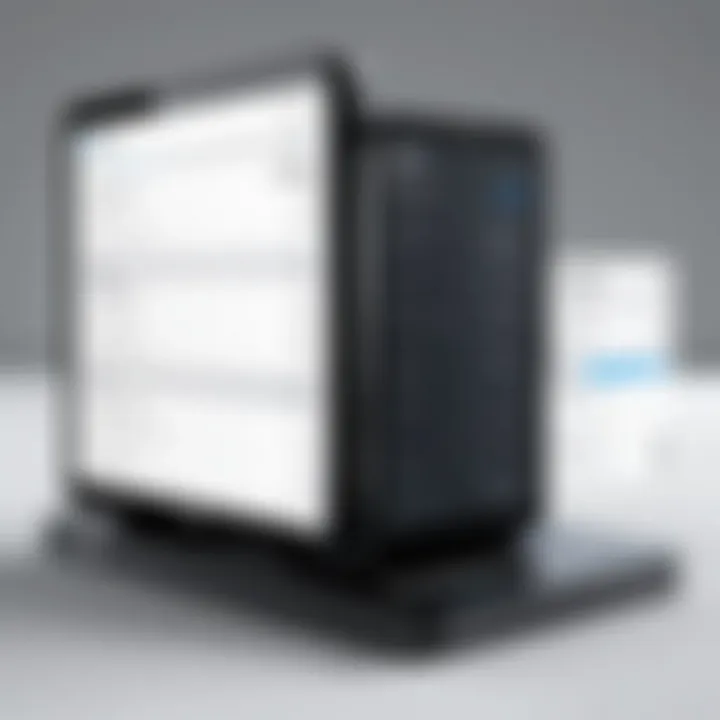
In summary, the integration capabilities of Zenoti POS play a critical role in enhancing the overall functionality of the system. By enabling seamless communication between e-commerce platforms, marketing tools, and accounting software, Zenoti empowers businesses to optimize their operations effectively.
User Experience
User experience (UX) is a critical focus when examining any software, including Zenoti POS. In the highly competitive wellness and beauty industry, having a user-friendly interface is key. A well-designed POS system not only enhances operational efficiency but also contributes significantly to customer satisfaction.
Several elements make up a good user experience in Zenoti POS. These include the clarity of the user interface, the intuitiveness of navigation, the speed of response, and the quality of support provided. A seamless UX minimizes learning curves for staff, ensuring they can operate the software proficiently from the start. This contributes directly to productivity gains in a business environment where time is of the essence.
Another important aspect of user experience involves feedback mechanisms. Feedback allows businesses to gather real-time insights into how well the system meets user needs. It also provides developers with critical information for ongoing improvements.
Feedback from Users
Feedback from Zenoti POS users provides valuable insight into their experiences. Users often praise the software for its ease of use. Many have noted that training staff is straightforward because the interface is intuitive, allowing users to familiarize themselves quickly with the system. This kind of feedback indicates a positive initial experience, which is crucial for any business adopting new software.
However, there are areas for improvement, according to users. Some have pointed out issues with specific features, such as appointment scheduling and reporting tools. For instance, users have reported that while scheduling is generally efficient, they occasionally encounter glitches that require workarounds. These insights are essential for Zenoti to refine its offerings and enhance user satisfaction further.
To illustrate the importance of user feedback:
"User feedback is not just a reactive measure; it serves as a proactive guide for developers to enhance software capabilities and usability over time."
Case Studies
Examining case studies allows a deeper understanding of Zenoti POS’s impact in real-world scenarios. Various businesses in the wellness and beauty sector have adopted Zenoti POS, leading to notable enhancements in their operations.
For example, a mid-sized spa in California implemented Zenoti POS and reported dramatic improvements in appointment management. Prior to using Zenoti, they relied on multiple systems, leading to confusion and double bookings. After transitioning to Zenoti, the spa streamlined its processes, resulting in a 30% increase in client satisfaction ratings due to reduced wait times and more organized services.
Similarly, a hair salon in New York reported that Zenoti's inventory management features helped them reduce waste by 15%. They benefited from real-time inventory tracking, allowing them to order supplies more efficiently. The combination of efficiency gains and improved service quality exemplifies the potential positive outcomes for businesses using Zenoti POS.
These case studies serve not only to highlight Zenoti’s usability but also to showcase the direct correlation between user experience and business outcomes. By providing tangible examples of success, Zenoti demonstrates its commitment to improving the user experience, which ultimately translates into operational effectiveness for its clients.
Pricing Structures
Understanding the pricing structures of Zenoti POS is essential for businesses considering its implementation. Pricing can significantly influence the decision-making process for organizations seeking to optimize their operations. Evaluating different pricing models allows businesses to align costs with their budget while ensuring they obtain value from the software's features. Additionally, it is crucial to recognize that pricing is often indicative of the potential return on investment.
Subscription Models
Zenoti POS operates on a subscription-based pricing model. This approach provides flexibility and allows businesses to pay for the services they use rather than committing to a large upfront investment. Subscription models can vary in tiers, often depending on the features and functionalities included.
Key Elements of Subscription Models:
- Tier Levels: Different tiers may offer varying features such as advanced analytics, multi-location capabilities, or additional support options. These tiers give businesses the option to choose a plan that suits their operational needs.
- Monthly vs. Annual Commitments: Most subscription services allow for monthly payments while providing discounts for annual commitments. Businesses need to analyze their cash flow situations to determine which option is best for them.
- Scalability: As a business grows, its needs may change. Subscription models typically offer scalability options, allowing businesses to add features or adjust their plans as required.
Cost Analysis
Performing a thorough cost analysis when considering Zenoti POS is essential. This analysis should go beyond the initial subscription fee and encompass all related costs. It often helps organizations to evaluate whether the software will provide them with sufficient return on investment.
Important Points for Cost Analysis:
- Total Cost of Ownership: This includes the monthly or yearly subscription fees, additional costs for extra features, and any integration expenses. Understanding the total cost of ownership helps in assessing long-term financial impacts.
- Cost Savings: Evaluate areas where Zenoti can help reduce operational costs, such as reducing staff time on manual schedules or inventory management.
- Revenue Opportunities: Look at how the software can enhance revenue through improved customer experiences, effective marketing tools, or more efficient sales processing.
- Hidden Fees: Be aware of potential hidden costs, such as transaction fees, or additional charges for customer support.
In summary, assessing the pricing structures of Zenoti POS consists of analyzing the various subscription models available and conducting a meticulous cost analysis. This approach ensures businesses can make informed decisions that align with their strategic plans and financial capabilities, leading to successful implementation and usage of the software.
Implementation Strategies
In the context of Zenoti POS, implementation strategies are crucial for ensuring that businesses maximize the benefits of this advanced point-of-sale system. A well-planned implementation process helps to mitigate potential issues, reduce operational disruptions, and improve overall satisfaction among users.
It involves several critical steps. The first step is assessing the specific needs of the business. Understanding the unique aspects of a wellness or beauty establishment can guide the approach toward implementation. Highlighting the distinct requirements allows for a tailored adaptation of the features offered by Zenoti POS.
After assessment, the next element is the onboarding process, which can set the tone for how effectively the software integrates into daily operations. A smooth onboarding phase enhances user confidence and encourages adoption among staff members.
Additionally, choosing a comprehensive training program is fundamental. Support systems must be established not only to facilitate initial usage but also to address ongoing concerns and foster continuous improvement.
Ultimately, focusing on implementation strategies can lead to operational success, which is vital for competitive advantage in the market.
Onboarding Process
The onboarding process for Zenoti POS involves preparing the business for a successful transition to the new system. This process encompasses several critical components:
- Pre-Implementation Planning: This phase focuses on identifying key individuals who will facilitate the onboarding. Initial meetings can help set expectations and establish a timeline.
- Data Migration: Transferring existing data into Zenoti POS in an efficient manner is vital. This ensures that business operations can continue without significant interruptions.
- Configuration and Customization: The software must be configured to align with the business’s specific processes, including menus, services, and pricing structures.
- Testing: Before going live, it's necessary to test the system to identify any potential issues. This phase ensures that all functions operate correctly and meet the business's needs.
Successful onboarding helps to build user confidence and encourages a positive attitude towards adapting to the new technology.
Training and Support
Once the onboarding process is complete, an effective training and support program becomes essential for successful usage of Zenoti POS. Training should focus on all aspects of the system, from basic functions to advanced features. This helps users understand how to leverage the software for maximum benefits.
Key elements of a comprehensive training program include:
- Hands-On Training Sessions: Direct interaction with the software allows users to learn through practice, thereby reducing fear of the unknown.
- Online Resources: Access to tutorials, webinars, and documentation helps users find answers quickly and easily.
- Ongoing Support: Establishing channels for ongoing support is important. This may include chat support, email assistance, and a dedicated helpdesk to address concerns post-training.
The right training and support structure not only improves user competency but also enhances overall satisfaction, ensuring that staff members feel confident in utilizing Zenoti POS effectively.
Customer Support Analysis
Customer support serves as a critical pillar for the success of any software solution, including Zenoti POS. In the fast-paced environments of wellness and beauty industries, the need for reliable support cannot be overstated. Businesses rely heavily on technology, and any hiccup can disrupt operations. Thus, having efficient customer support in place ensures that issues are resolved swiftly, minimizing downtime and customer dissatisfaction.
Key elements of customer support in the context of Zenoti POS include the availability and responsiveness of support channels, as well as the quality of solutions provided. Understanding these factors can provide insight into how Zenoti serves its users effectively.
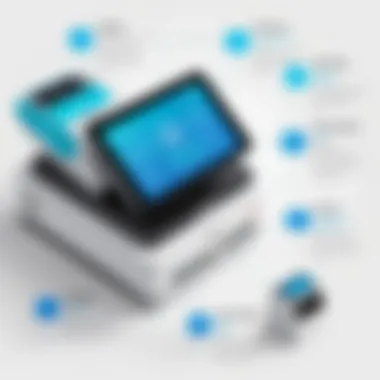
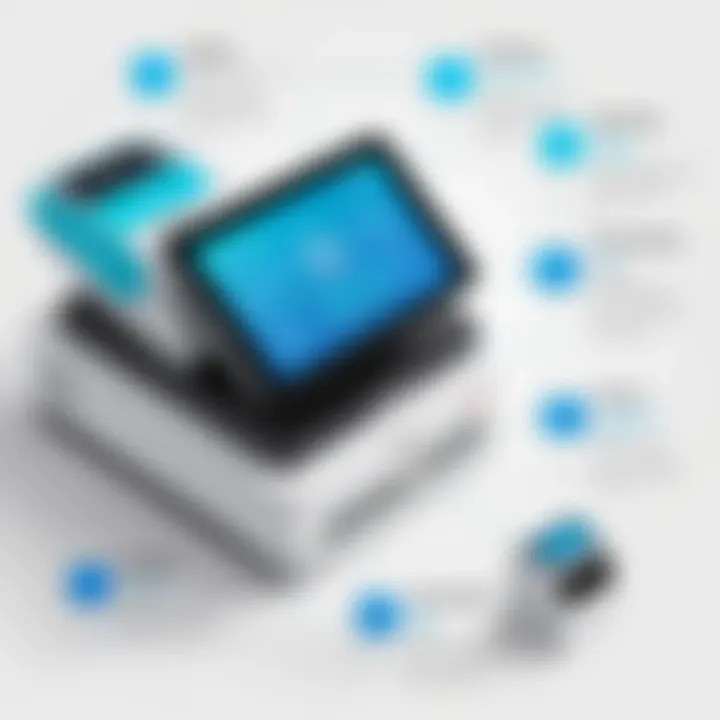
Support Channels
Zenoti POS offers multiple support channels to cater to diverse needs. These channels typically include:
- Phone Support: Direct voice communication allows for immediate assistance, which can be crucial during urgent situations.
- Email Support: This channel is beneficial for non-urgent inquiries and provides users the opportunity to articulate their issues clearly.
- Live Chat: Available on their website, this option allows users to interact in real-time with support representatives, making it ideal for quick questions.
- Knowledge Base and FAQs: An extensive online repository of resources, this can empower users to find solutions independently, reducing the need for direct contact.
This multi-channel approach not just enhances user experience, but also reinforces customer confidence in the software.
Response Times
The efficiency of customer support is often measured through response times. For Zenoti POS users, timely responses are a critical success factor. Users generally expect:
- Immediate Assistance: In many cases, especially with technical issues, users may need resolutions on the spot. Businesses cannot afford to wait.
- Prompt Acknowledgment: If a user submits an email or uses a contact form, a quick acknowledgment assures them that their request is being handled.
- Consistent Follow-Up: After solving an issue, follow-up is essential to ensure continued satisfaction and to address any further questions.
According to user feedback, Zenoti generally maintains a competitive standard in response times, often resolving issues within a few hours. However, the consistency of this response may vary depending on the inquiry's complexity.
Timely and effective customer support is not just a necessity; it is a strategic advantage for businesses utilizing Zenoti POS.
Comparative Analysis
In the rapidly evolving sector of point-of-sale (POS) systems, comparing options is critical for businesses. Comparative analysis allows organizations to evaluate different solutions based on specific criteria such as functionality, cost, and integrations. For stakeholders in the wellness and beauty industry, understanding how Zenoti POS measures up against its competitors can significantly influence purchasing decisions.
This section provides a detailed examination of Zenoti among its rivals, analyzing key features, usability, and overall market position. The analysis will help businesses identify strengths and weaknesses aligned with their operational needs—enabling informed choices.
Zenoti vs. Competitors
When placed beside competitors like Square, Clover, and Mindbody, Zenoti sets a high standard for features tailored speciifically to wellness and beauty. Here are some points of differentiation:
- Specialized Features: Zenoti excels in offering services specific to salons and spas, including membership management and advanced scheduling capabilities.
- Client Management: It provides a robust CRM system to track customer preferences, history, and appointments, enhancing personalized service.
- Integration Efforts: Zenoti easily integrates with e-commerce and marketing platforms, allowing businesses to consolidate operations.
However, competing products have notable aspects:
- Cost Efficiency: Square and Clover often present more cost-effective solutions, particularly for smaller businesses in need of basic functionality.
- Simplicity: Competitors may offer more intuitive user interfaces, which can reduce the learning curve for new staff.
From this comparison, it becomes clear that Zenoti’s strength lies in its rich feature set. However, businesses must weigh this against their specific requirements, be it comprehensive utility or simple implementation.
Pros and Cons
Every system has its advantages and disadvantages. Understanding these can further guide decisions. Below are some observations about Zenoti.
Pros:
- Comprehensive Functionality: Zenoti addresses critical needs of the wellness industry with tailored solutions.
- Scalability: It can grow with a business, adapting as operational needs evolve.
- Robust Support: Users often report satisfaction with customer support, providing assistance when needed.
Cons:
- Higher Initial Cost: The comprehensive features come at a premium which may not be suitable for all budgets.
- Complex Interface: Some users find it overwhelming due to the abundance of features, requiring extensive training.
Future Trends in POS Systems
The landscape of point-of-sale systems is changing rapidly. Understanding these shifts is vital for businesses aiming to remain competitive and streamlined. Future Trends in POS Systems is crucial because it helps organizations prepare for emerging technologies, user preferences, and market conditions. Staying informed allows businesses to make proactive choices that enhance operational efficiency and customer satisfaction.
Technological Advances
Technological advancements play a pivotal role in shaping the future of POS systems. With increasing integration of AI and machine learning, systems like Zenoti POS can provide data-driven insights to enhance the user experience. Businesses will benefit from predictive analytics that anticipate customer needs, optimize inventory management, and streamline appointment scheduling.
- Key technological trends include:
- Mobile POS Systems: Portability allows staff to assist customers directly on the sales floor, creating a seamless shopping experience.
- Contactless Payment Options: Enhanced payment modes improve transaction speed and security.
- Cloud-Based Solutions: These provide flexibility and remote access to data, ensuring operations continue efficiently even when teams work from different locations.
By adopting these advancements, businesses can substantially improve their operational capabilities and unlock new revenue streams.
Market Predictions
Market predictions suggest that the demand for sophisticated POS systems will continue to grow in various sectors, particularly in the beauty and wellness industries where Zenoti POS excels. Analysts predict an increase in the integration of advanced features that cater to specific needs of these sectors. Customers favor systems that provide both functionality and simplicity.
- Expected market trends include:
- Growth in Subscription-Based Models: As more businesses look for cost-effective solutions, subscription models are becoming more appealing.
- Increased Focus on Customer Experience: Businesses will prioritize solutions that enhance interactions, leading to loyalty and repeat business.
- Expansion of Omni-channel Capabilities: Companies are expected to implement systems that provide seamless experiences whether customers engage online or in-store.
These trends underline the importance of adaptability and foresight. Businesses that strategically evaluate these market predictions will position themselves to leverage advancements in technology and customer engagement, maximizing their potential for growth and success.
"Understanding emerging trends is not just advantageous; it is essential for survival in a competitive market."
By keeping abreast of technological advances and market predictions, businesses can craft a solid strategy to utilize POS systems more effectively.
End
The conclusion of this article serves as a vital synthesis of the insights gathered throughout our examination of Zenoti POS. By summarizing key points on features, user experiences, and market trends, it emphasizes the importance of understanding this platform for businesses in the wellness and beauty industry.
Summary of Insights
In reviewing Zenoti POS, several critical insights have emerged:
- Functionality: Zenoti offers a comprehensive point-of-sale solution addressing various operational needs. From appointment scheduling to payment processing, the software is tailored for efficiency.
- User Feedback: Users report high satisfaction rates, particularly regarding interface ease and customer support.
- Integration Strengths: The ability to integrate with various e-commerce platforms and marketing tools enhances its value for businesses seeking to streamline operations.
In summary, the insights provided reveal that Zenoti POS not only meets but often exceeds the expectations within its target market. Its holistic approach ensures that businesses can optimize their processes effectively, enhance the customer experience, and ultimately drive growth.
Recommendations for Businesses
For businesses considering an investment in POS systems, the following recommendations are pivotal:
- Assess Specific Needs: Companies should evaluate their unique operational requirements and choose a POS system that aligns with those needs. Zenoti may be especially suitable for those in the wellness and beauty sectors.
- Utilize Training Resources: Ensure your team is fully trained in using Zenoti’s features to maximize its benefits. The smoother the onboarding, the quicker the realization of productivity gains.
- Regularly Review Integrations: As technology evolves, staying updated on integration capabilities with other systems is essential. This can enhance efficiency and expand functional use over time.
By paying close attention to these recommendations, businesses can make informed decisions about adopting Zenoti POS, ensuring they leverage its strengths to enhance operational effectiveness and customer satisfaction.







